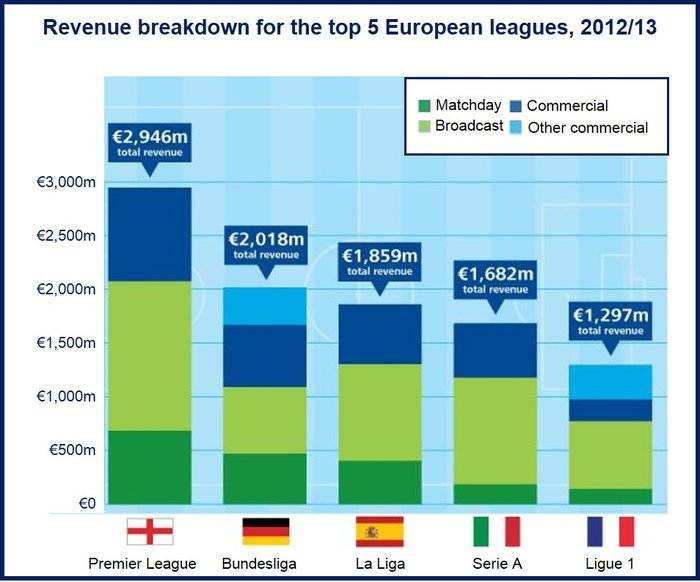England’s Premier League revenue hit a record £2,525m in the 2012/2013 season, according to Deloitte’s 23rd Annual Review of Football Finance. Revenue for the top 92 English football clubs reached nearly £3.2 billion.
Dan Jones, a Partner in the Sports Business Group at Deloitte, said
“Once again the global appeal of the Premier League has continued to drive commercial revenue growth, particularly at the highest ranked Premier League clubs. Matchday revenue also increased by 6% with fewer unsold seats at Premier League games than ever before.”
Increase forecast for 2013/14
Mr. Jones estimates that Premier League clubs will achieve a revenue increase of nearly 30% in 2013/14 to £3.2 billion, driven by the Premier League’s first season broadcast deals plus additional commercial revenue growth at the major clubs.
More than three-quarters of the total revenue earned by the Premier League clubs in 2012/13 went on wages, which increased by 8% or £125 million to £1.8 billion. The average wages-to-revenue ratio of the clubs reached a record high of 71%.
With wages making up such a high proportion of revenue, aggregate operating profit fell by £2 million to £82 million, an operating margin of only 3% of revenue. However, in the 2012/13 season, thirteen Premier League clubs made an operating profit compared to just 10 in 2011/12.
The Premier League’s wage bill is set to rise again, says Adam Bull, Senior Consultant in Deloitte’s Sports Business Group.
Mr. Bull said:
“The pattern in spending on wages following previous increases in broadcast deals, suggests it’s likely around 60% or more of the revenue increase in 2013/14 will flow through to wages. On that basis, we would expect Premier League total wage costs to reach a new record level of around £2.2 billion.”
“However, given the forecast increase in revenue, this would also return the wages to revenue ratio below 70% for the first time since 2009/10.”
Bad year for championship clubs
The Championship clubs had a particularly bleak year in 2012/13. While revenue dropped £39 million wage costs rose by £40 million, resulting in record operating losses of £241 million. A £170 million increase in pre-tax losses was registered, i.e. £7 million for each club, to £323 million.
Mr. Bull added:
“The 2012/13 wages to revenue ratio for Championship clubs of 106% is the highest ever recorded by an English division and is clearly unsustainable without ongoing owner support. The introduction of the Championship Financial Fair Play Rules was widely seen, and advocated by the clubs who voted it in, as a necessary step to change clubs’ behavior.”
“The severity of the punishments applied to those who have not complied with the rules in the 2013/14 season and the eventual result of efforts to change the rules, will determine the extent to which they present an effective deterrent to widespread overspending.”
Below are some other highlighted findings from the Deloitte Annual Review of Football Finance 2014:
- The European football (soccer) market expanded to €19.9 billion (£17.1 billion) in 2012/13.
- England’s Premier League clubs generated £2.5 billion, more than any other league in Europe, followed by Germany £1.7 billion, Spain £1.6 billion, Italy £1.4 billion and France £1.1 billion.
- With operating profits of £226m, the German Bundesliga is Europe’s most profitable, followed by the Premier League (£82 million).
- Premier League clubs achieved an average league capacity of 96% in 2013/14, a record and the 17th successive season above 90%.
- Investments in stadia and facility by the top 92 English clubs reached £211 million in 2012/13, the largest amount since 2006.
- The net debt of Premier League clubs stood at £2.5 billion, six percent (£139 million) more than in 2012.
- The UK government collected approximately £1.3 billion in taxes from England’s top 92 professional football (soccer) clubs in 2012/13.
(Source: Deloitte)


